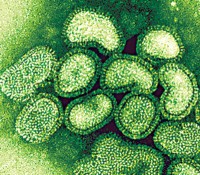Buncombe County public health officials are readying to deal with up to 30 or 40 percent of Asheville being infected with either seasonal flu or the H1N1 virus at any one time in coming months, and will be distributing vaccines to school children and other vulnerable populations.
“We are preparing for many, many people to be infected,” Health Director Gibbie Harris told reporters at a briefing Friday morning. “We know we’ve got it [the flu] in the community, it never really went away over the summer. With schools coming back and moving into a new flu season, our expectation is that it’s just going to balloon.”
The estimates come from national and world health organizations, according to Harris.
There have been 19 confirmed cases of the H1N1 virus, also called “swine flu,” in Buncombe County, and one death. However, Harris said that there are probably hundreds more cases that have not been confirmed due to the complexity and time required to test for H1N1.
For most individuals, she emphasized, H1N1 is relatively mild, though certain populations are far more vulnerable.
“The difficulty will come with the number of people that are going to be affected at any given time,” Harris said. “That’s what’s going to cause problems for our community. It could be that we have many health care workers out at one time that will make it difficult for our hospitals and our doctors’ offices to see the people that are sick. We may have lots of people out from the food industry out at one time. That’s the issue for us as we move in: it’s the sheer volume.”
In October, county health staff will begin vaccinating children in kindergarten through fifth grades in Buncombe County and city of Asheville schools, as well as charter schools. Vaccines, will be available free to all students who bring in a parental permission slip. Harris said health officials hope to vaccinate 50 percent of that age group, or about 6,000 children.
Parents will receive an automated phone message from the local school systems on Sunday night, advising them to look for vaccination consent forms in their children’s back-to-school informational packets. They’ll be encouraged to fill out those forms again at meet-the-teacher nights next week, where nurses will be on hand to help explain the consent forms. Sept. 11 is the deadline for parents to complete the consent forms, but late filers will be accommodated.
The seasonal flu vaccine is normally available for about $30 as an injection or nasal mist.
The county will also try to assist businesses and public services with dealing with a temporary loss of personnel.
“We’re asking them how they’re going to cross-train their staff to make sure sufficient staff that their primary role gets done,” Harris said. “That’s critical with our city and county services, the schools, the colleges, our water system and food supply need to stay up and running. People need to have gas for their cars. It’s critical our businesses think about that as well.”
The Asheville area also includes a large service industry sector, where workers come into constant contact with the public and may, for financial reasons, be reluctant to stay home from work if they become infected. When asked, Harris responded that “they need to take the time off. Another issues for employers to consider is how they’re going to support their staff through this process. If they start firing everybody because they take a week off from work they won’t have anybody to come back, so we’re asking for some give and take here. It’s not a normal situation.”
The H1N1 vaccine, which the health department will be receiving in October, will only be given, for free, to vulnerable populations — young children, pregnant women, adults under the age of 24 and those with existing medical conditions.
“We’ll be getting only a third of the vaccines we expected,” Harris said. “So we’re going to start with those target groups and extremely high risk individuals.”
The county is working with UNCA, AB-Tech and Warren Wilson colleges, which will all receive H1N1 vaccines to help the under-24 age group.
If a person becomes infected with the flu — either seasonal or H1N1 — the health department recommends they stay home until they go 24 hours, un-medicated, without symptoms. It’s recommended that people prepare a kit of emergency supplies and get a “flu buddy” to run errands and help them, Harris said. The county is also looking for volunteer nurses to assist with the vaccination efforts.
“This is still a mild virus, that’s the good news. Most people will get sick and get well,” Harris said. “This fall, it’s going to be all hands on deck.”
Click here to go to Xpress Files and read a briefing paper about the flu provided by Buncombe County public health officials.




more fear mongering…and by the way there is NO EMPIRICAL EVIDENCE that “flu shots” prevent flu. its an absolute gamble that the vaccination you get is the strain thats coming around. use prudent precaution, eat right ,exercise and sleep well, this will protect you better than a “flu” shot.
flu shots spread flu.
“its an absolute gamble that the vaccination you get is the strain thats coming around. use prudent precaution, eat right ,exercise and sleep well, this will protect you better than a “flu” shot. “
For those not old enough to remember, here in the states we’ve gone through the pig pandemic of fear a few times! Many who were vaccinated in the 1970’s either died, or were permanently crippled for life by the pharmaceutical companies who knowingly injected toxic substances into people.
CBS ” 60 MINUTES” documentary on the swine flu epidemics of 1976 in the U.S. It went on air only once and was never shown again.
http://www.dailymotion.com/video/x9mh9f_swine-flu-1976-propaganda_webcam